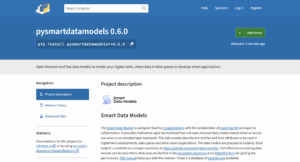We are very close to launch a new service and we want to have your feedback on how to create this service.
So we made a Survey and you can help us by submitting your preference.
Thank you!
We are very close to launch a new service and we want to have your feedback on how to create this service.
So we made a Survey and you can help us by submitting your preference.
Thank you!
The contribution manual has minor updates frequently, but now we have created a brand new version
– Restructuring the contents
– Including explanation on how to use the test service for new data models
– Making more understandable the contribution workflow
– Guidelines for contributing
– The list of support channels, including the new on discord
– Move to the annex the slides for the automatic documents generated on the publication process
and helping to make more understandable to those users recently joining the Smart Data Models initiative.
As always the shortcut to reach it works: https://bit.ly/contribution_manual
But you can also find a direct link in these locations
Upper menu -> Contribution manual (7th option)
Main menu -> documentation -> Contribution manual (5th option in the drop down menu)
Feel free to make your comments on info@smartdatamodels.org or as comments in the manual.
The new version of the script for generating the specifications has been released in the directory utils of the umbrella repository data-models.
It allows the creation of the markdown specifications out of the json schema in multiple languages. If you have an account of DeepL API you can make the translations automatically.
Thanks to Konstantinos Gompakis from tuc.gr for this suggestion on others.
Hopefully you have unnoticed about several structural changes this weekend that has happen at SDM.
Now there are several additional information included.
— A unique id for every attribute of a version of a data model (i.e.
— The link to the parent’s attribute (whenever there is a parent) context link (i.e. https://smartdatamodels.org/address)
— The unique id of the parent attribute (whenever there is a parent) (i.e.
— The @context link of the attributes pointing to an existing web page with some details about the attribute (i.e. https://smartdatamodels.org/postOfficeBoxNumber)
Now the second level of attributes is available in the specification document for all the languages (i.e. https://github.com/smart-data-models/dataModel.User/blob/master/Activity/doc/spec.md)
Now the second and subsequent levels of the attributes have URI entries in the @context included in the file context.jsonld file in every subject (i.e. https://github.com/smart-data-models/dataModel.Environment/blob/master/context.jsonld)
The URI of the data models points to a existing web page (i.e. https://smartdatamodels.org/dataModel.Environment/ambientNoiseTSA)
Besides this we welcome a new member of the SDM team, Rihab Feki.

questions/suggestions to info@smartdatamodels.org
There is a new version of the python package for pysmartdatamodels 0.6.0.
This python package includes all the data models and several functions to use them in your developments.
Changelog:
– Four new functions
– Acknowledgement session has been added into the README.

Get more details on the pypi page and feel free to try it out!
We are considering to officially provide an attestation of your contributions to SDM.
Before launching it officially we have created a drafted document for those contributors with a valid mail and name (there are people who do not want to disclose their contribution).
Accordingly, if you browse the database of contributors you will see a new column with the heading attestation and a download draft link.
By clicking on that link you can download the draft version of an attestation of your contribution.
We’ll be glad to receive your feedback on this initiative and the format and content of the attestation in the info@smartdatamodels.org address.
You can see an example below
attestation_alberto.abella@fiware.org_dataModel.Agrifood_2022
Now you can see in the right widget a new entry with the link for our channel on discord #smart-data-models, you can also send your question there. (But only once you have joined by using this invitation )
If you need help on discord channel you can browse this link.

We have released two very simple programs to create an entity in a context broker and for removing an entity based on its id.
Although this is pretty straight forward, being coded in PHP allows you to integrate with, in example, in a WordPress site.
In fact these programs are working in the test Orion-LD broker option, located here at home -> tools -> test Orion-LD broker
The source code is available at the utils directory and the data-models umbrella repository
In the tools menu there is a new option “Test Orion-LD broker“.
In this address https://smartdatamodels:1026 there is an Orion-LD Broker installed open for testing purposes. You can check
It is wiped out every hour, on minute 27, and then repopulated with some hundreds of examples (most of the current examples in data models).
Some examples of queries:
Here there are the slides of the ERIDANIS company regarding the use of SDM in the project for the creation of a Hospital digital twin with NGSI-LD presented during the FIWARE Summit in Vienna.
It deals with the mapping of HL7 standard and to use some alternatives.